
December 10, 1996
Judith Rodin
"The Commission's Charge"

Judith Rodin
"The Commission's Charge"
JUDITH RODIN: We're going to set up the overhead projector, and I'm going to take a crack at summarizing--just a minute ...(unintelligible) From my own perspective, as somebody who has studied group process and was trained as a social psychologist, I think this was a very good and interesting group process. This is an extremely multidisciplinary group and a group that really has a very diverse range of experiences, both professional and, I think, personal, and it was very important to get a variety of ideas out on the table to as a way of getting to know one another.
I gave up the traditional new meeting model of having us each go around the room and say a little bit about ourselves, who we were and why we were here because I really hoped--and I think the result proves this--that each of us would clearly demonstrate who we were and why we were here by our conversation and our comments through the day and a half. The effort to have some level of integration, I think, will be achieved in a couple of different ways. We will actually transcribe the comments as well as the proceedings, and we will work over the next few weeks to try to synthesize the actual comments and to bring together some of the common points and common themes. So I am not going to make an effort at that synthesis today, but rather to try to point us--and I'll use overheads that we created at lunchtime--to point us to questions for our agenda, and then we can use the flip chart as you add to these.
What I'd like to do is go through them all and then come back. We are clearly not going to have time to discuss all of them in detail, and we'll continue our discussion of them over the next weeks and months, but to lay out four or five fairly differentiated set groups of questions that we think collectively represent much of what we've talked about in the last day and a half. Thank you.
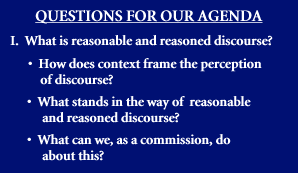
We talked a bit about how context frames the perception of discourse. What is appropriate in one context may be inappropriate in another, so there's not an absolute with regard to the answer to the first question, what is reasonable and what is reasoned? And I think context will be important particularly as we talk about culture and community, which are contextual variables, in addition to being other kinds of variables, that the role of context as a framing principle is really quite important. We will need to answer, in a variety of ways--and again, we've begun that--what stands in the way of reasonable and reasoned discourse. We had a variety of candidates and, I think, some very serious discussion about that. But I think we will need to come to terms with that. And then we should answer the question what would we, as a commission, like to do about that? What could we do? And I think there are a variety of things that we might do. What would we like to do as we define our agenda going forward?
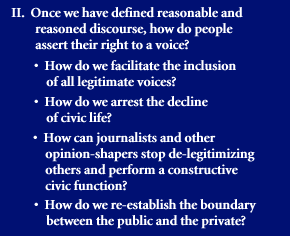
How do we arrest the decline of civic life? We focused a great deal on journalists, but there are varieties of other opinion-shapers, the TV media, political leaders, academics. How do the opinion-leaders and -shapers stop this delegitimization process that I think we have appropriately identified, and perform, if possible, a more constructive civic function? And then how do we re-establish, if we think that's appropriate, a clearer boundary between public and private if that represents a problem for our society and for our societies around the world?
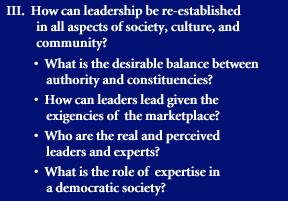
A different question that we discussed is the question of how leadership can be re-established in all aspects of society, in all aspects of the community. We talked a lot about what the balance should be between the role of experts, the role of the authority and the role of the constituencies as we tried to restore some level of community and some level of civil discourse. How can leaders lead? Kathleen emphasized the positive pressures of the marketplace, but there are so many negative pressures of the marketplace. And the question is how does one assert a leadership role in this very market-driven moment in our society? Who are the real and perceived leaders and experts? We flirted with that issue a little bit. I don't think we really came to a full discussion of it. It leads to the question of what is the role of expertise in a democratic society and how do we grapple with that?
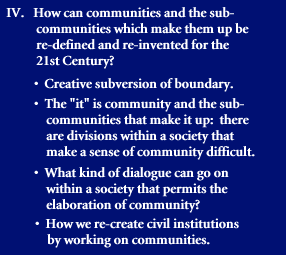
Finally--and this is just on a quick overhead because it summarizes the last session--we talked about community, the creative subversion of boundary, if you will. The 'it' is the community, the subcommunities that make it up. There really are divisions within our society that make a sense of community difficult. And we're asking the question what kind of dialogue goes on that permits communities to reassert themselves, that permits an elaboration of community as a principle and as a process, and what kinds of institutions would make our community structures stronger and more readily reinforced?

And then finally [I] think we discussed not directly, but implicitly, this question, and that is if we address our work as a commission, should it be addressed to the gatekeepers of opinion--the leaders, the media, the politicians--or should it be addressed to the general public, in terms of our efforts--community building, bringing ordinary people together? And I think we need to grapple with which, or both, of those kinds of approaches--and maybe others as well--should we take.
And I think part of the answer to that depends on your view of where the current problems are the greatest and/or where the current solutions are more potentially to be had. But I think we do need to think about that as a commission.
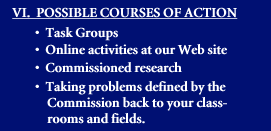
I think that there are a variety of courses of action, and here I talk about process, rather than the substance. We could divide into task groups and take on others with us; we could commission research or papers; we clearly are going to have online dialogue using our Web site. Certainly, we could, at the very most limited, merely increase our efforts by taking the problems that we've discussed back to our classrooms, our colleagues, our fields, in a variety of ways.
So we could have papers; we could do research; we could bring groups together; we could have various kinds of initiatives with various kinds of groups. The monetary resources are not, at least for the moment, the inhibitor. It's really thinking about the structure and how we relate to some of these other very interesting initiatives. We need to relate to the civic journalism project, to Jim's project, to other initiatives that are grappling with certain aspects of this same issue in a way that's constructive and creative, I think, rather than redundant.
So that's my mini-review. It clearly can't capture all of the domains in which we might work, but I've tried to capture at least some of the more salient ones as I saw them. I'm happy to put any of these back on or to take other candidates. I'll certainly circulate this, and we'll take minutes here and circulate that as well and continue from that frame. But, Michael, if you'll help me, why don't we see if there are other candidates or what your reactions are to what I've proposed?